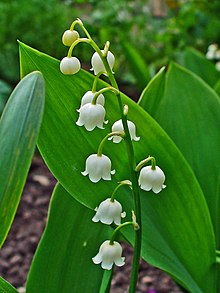Convallaria majalis
| Lily of the valley | |
|---|---|
 |
|
| Scientific classification | |
| Kingdom: | Plantae |
| Clade: | Angiosperms |
| Clade: | Monocots |
| Order: | Asparagales |
| Family: | Asparagaceae |
| Subfamily: | Nolinoideae |
| Genus: | Convallaria |
| Species: | C. majalis |
| Binomial name | |
|
Convallaria majalis L. |
|
Lily of the valley (Convallaria majalis /ˌkɒnvəˈleɪriə məˈdʒeɪlɪs/), sometimes written lily-of-the-valley, is a sweetly scented, highly poisonous woodland flowering plant that is native throughout the cool temperate Northern Hemisphere in Asia, and Europe. Other names include May bells, Our Lady's tears, and Mary's tears. Its French name, muguet, sometimes appears in the names of perfumes imitating the flower's scent.
It is possibly the only species in the genus Convallaria (depending on whether C. keiskei and C. transcaucasica are recognised as separate species). In the APG III system, the genus is placed in the family Asparagaceae, subfamily Nolinoideae (formerly the family Ruscaceae). It was formerly placed in its own family Convallariaceae, and, like many lilioid monocots, before that in the lily family Liliaceae.
Convallaria majalis is a herbaceous perennial plant that forms extensive colonies by spreading underground stems called rhizomes. New upright shoots are formed at the ends of stolons in summer, these upright dormant stems are often called pips. These grow in the spring into new leafy shoots that still remain connected to the other shoots under ground, often forming extensive colonies. The stems grow to 15–30 cm tall, with one or two leaves 10–25 cm long; flowering stems have two leaves and a raceme of 5–15 flowers on the stem apex.
...
Wikipedia
